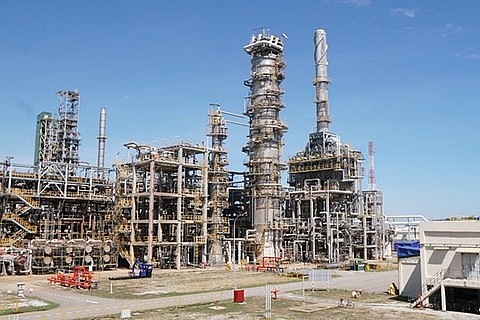MoF proposes to reduce tax for input material of petrol products to 10%
According to the draft proposed by the ministry for the second time, the reduction of MFN rate is for the imports of those petroleum products in the group of HS code 2710 to support for production and consumption. They are HS codes 2710.12.31, 2710.12.39, 2710.12.40, 2710.12.50, 2710.12.60, 2710.12.70, 2710.12.80, 2710.12.91, 2710.12.92, and 2710.12.99.
 |
| A view of the Dung Quat Oil Refinery. The reduction of the MFN tariff to zero is also proposed for some items like intermediate products for oil refiners, such as VGO, residue and condensate. - VNA/VNS Photo |
Meanwhile, the MFN tariff for ethanol products with HS code 2207.20.11 and 2207.20.19 is 15 per cent at present. Meanwhile, the preferential tax rate under ASEAN Trade in Goods Agreement (ATIGA) and Vietnam-Korea Free Trade Agreement (VKFTA) for these products is zero.
Viet Nam's import value of this product that was used in many industries reached $48.7 million in 2021, including 62 per cent of the imports from the US.
In the context of high domestic and world gasoline prices and a shortage of gasoline supply, the import of ethanol would make up for the shortfall of gasoline. Ethanol products also enjoy preferential rates in environmental protection tax and special consumption tax.
Therefore, the ministry has proposed to cut MFN tariff for ethanol from 15 per cent to 10 per cent, instead of the 12 per cent in the proposal for the first time.
In August, the Government issued a reduction of MFN tariff for imported unleaded motor gasoline from 20 per cent to 10 per cent as one of the solutions on cutting retail prices on the domestic market that have increased sharply following surging oil price on the world market.
The reduction of the MFN tariff to zero is also proposed for some items, like intermediate products for oil refiners, such as VGO, residue and condensate, to ensure enough supply of those products for petroleum production.
According to the Ministry of Finance, gasoline products are mainly imported from countries that have signed free trade agreements (FTAs) with Viet Nam, so they enjoy a lower FTA import tax rate compared to the MFN tariff.
The General Department of Customs reported that last year, Viet Nam's total taxable import turnover of petroleum products was $475.3 million, including $474 million from the imports from countries that have signed FTAs.
In the first five months of 2022, the total import value of gasoline imposed tariff was $826.5 million, which was also mostly imported from countries that have signed FTAs with Viet Nam.
Thus, the imported gasoline with the MFN tariff had a small volume, so the reduction of the MFN import tariff for gasoline products will not have much impact on the State budget revenue.
Meanwhile, the reduction of import tariff for materials of oil refineries such as VGO, residue and condensate would not cause a large reduction in revenue for the State budget and also help the refineries diversify the supply resources of those materials.
According to economic expert Nguyen Minh Phong, the MoF's continuous reduction of taxes on some essential goods such as petrol and oil, or some materials for production targets to restore economic growth. It also lowers the prices of many commodities to prevent inflation from rising.
Together with supportive packages on fiscal and monetary policies, the Government issued many other policies to support people and businesses. It also assigned ministries and branches to have specific supportive policies for the businesses.
In the draft decree proposed for the second time, the ministry has increased the export tariff on fertilisers. Accordingly, the tariff for fertiliser products increases from zero to 5 per cent, including urea, phosphate, superphosphate, DAP, and MAP.
Meanwhile, for domestic NPK fertiliser meeting the domestic demand and having a large volume for export, it proposes to stipulate a zero export tax rate to not affect domestic production.
During the management process, the Ministry of Finance would have flexible and proactive restructuring of revenue sources. At the same time, it would implement many measures to increase revenue for the State budget.
 | Understanding global oil and gas sector management Decree No.95/2021/ND-CP on petroleum trading officially took effect at the beginning of the year and was expected to strengthen the market. However, the continuous changes in gasoline prices, combined with the inadequacies in management, has had a great impact on market supply and demand and also pushed the business and consumer world into unprecedented difficulties. The question of how to foster a healthy market and ensure energy security has not been resolved. |
 | Stabilisation fund not the true answer for reducing costs in the petrol market For the first time, retail prices of diesel and kerosene are higher than gasoline prices, as recorded on September 15. The Ministry of Industry and Trade explained that there is a big difference between gasoline and global oil prices. |
 | Volatility forces balancing act for Vietnam’s petrol market Amid the continuously fluctuating prices for oil and gasoline, Vietnam is injecting millions of US dollars into the import of these commodities while inadequacies in the domestic market have not yet been resolved. |
What the stars mean:
★ Poor ★ ★ Promising ★★★ Good ★★★★ Very good ★★★★★ Exceptional
Related Contents
Latest News
More News
- Citi sharpens its focus on institutional banking (February 09, 2026 | 19:58)
- SSC steps up engagement with FTSE Russell on market reforms (February 09, 2026 | 17:33)
- IFC considers $50m trade finance guarantee facility for Nam A Bank (February 09, 2026 | 17:28)
- Hoa Phat Agricultural Development debuts shares on HSX (February 06, 2026 | 14:00)
- Vietcap’s VAD 2026 draws strong global investor turnout (February 06, 2026 | 13:30)
- New rules ease foreign access to Vietnam equities (February 05, 2026 | 17:29)
- 0.1 per cent tax proposed on each transfer of digital assets (February 05, 2026 | 17:27)
- Ministry of Finance tightens policy delivery at start of year (February 05, 2026 | 17:26)
- Vietnam steps up market reforms as FTSE Russell reviews upgrade progress (February 05, 2026 | 17:20)
- 2025 profits mixed amid strong energy and farming results (February 05, 2026 | 17:18)

 Tag:
Tag:



















 Mobile Version
Mobile Version